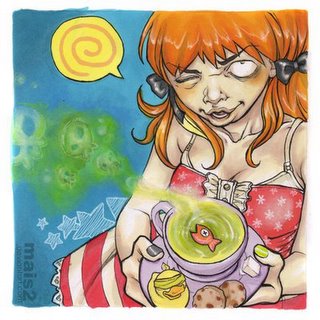

 children long periods outdoors so they have enough time to become fully engaged in play and have a overhang in the back yard in order for us to play outdoors in poor weather. 6 seat Buggy rides are part of our weekly activities. There are no dittos offered, instead we learn through hands-on, meaningful experiences (ex: cause and efffect -using items in the water table- some float and some sink). The more experiences children have with their surroundings, the more they learn. We also prepare children for preschool by helping them develop empathy and concern for others. Pre-math, Early literacy and appreciation of the arts (music and mixed media) are incorporated into our curriculum. Preschool is M-F/9:30-11.
children long periods outdoors so they have enough time to become fully engaged in play and have a overhang in the back yard in order for us to play outdoors in poor weather. 6 seat Buggy rides are part of our weekly activities. There are no dittos offered, instead we learn through hands-on, meaningful experiences (ex: cause and efffect -using items in the water table- some float and some sink). The more experiences children have with their surroundings, the more they learn. We also prepare children for preschool by helping them develop empathy and concern for others. Pre-math, Early literacy and appreciation of the arts (music and mixed media) are incorporated into our curriculum. Preschool is M-F/9:30-11.
 One Step Ahead is a great resource for new parents. when you visit their site you can find:
One Step Ahead is a great resource for new parents. when you visit their site you can find:
 I heard from a Mother/Care Provider recently who was becoming "burnt out." The message I heard was "How can I care for younger children and at the same time keep the school age child I care for entertained? We have been taking trips to the park, visiting the "jumpy houses." Now he's been saying he's bored. I don't know how to keep every one happy. I'm so stressed out!"
I heard from a Mother/Care Provider recently who was becoming "burnt out." The message I heard was "How can I care for younger children and at the same time keep the school age child I care for entertained? We have been taking trips to the park, visiting the "jumpy houses." Now he's been saying he's bored. I don't know how to keep every one happy. I'm so stressed out!"

 Does your child act like you're trying to poison him everytime you offer broccoli?? Here are my favorite strategies to get your child interested in healthy foods.
Does your child act like you're trying to poison him everytime you offer broccoli?? Here are my favorite strategies to get your child interested in healthy foods. Parents; a great idea for the small budding artist in your family is bath tub painting. this involves the child (in clothes that you don't mind paint getting on), non-toxic paint, and sponges or brushes. I used to let my daughter sit in an empty bathtub in her diaper only with these items and paint away (always supervised). They love the experience, and the clean-up is easy.
Parents; a great idea for the small budding artist in your family is bath tub painting. this involves the child (in clothes that you don't mind paint getting on), non-toxic paint, and sponges or brushes. I used to let my daughter sit in an empty bathtub in her diaper only with these items and paint away (always supervised). They love the experience, and the clean-up is easy.

 knitting is a great skill which is easy to teach children between the ages of 6 and 12. It is something that they can do in the car on long trips, in a restaurant, or while waiting in the doctor's office. I can testify that as a Mother of three children between the ages 9,10 and 11, knitting relieves tension and illiminates bickering because they become so engaged in it. It also brings your family together; instead of everyone being in their bedrooms playing video games or entranced in T.V., knitting allows everyone to be in the same room doing the same thing.
knitting is a great skill which is easy to teach children between the ages of 6 and 12. It is something that they can do in the car on long trips, in a restaurant, or while waiting in the doctor's office. I can testify that as a Mother of three children between the ages 9,10 and 11, knitting relieves tension and illiminates bickering because they become so engaged in it. It also brings your family together; instead of everyone being in their bedrooms playing video games or entranced in T.V., knitting allows everyone to be in the same room doing the same thing.